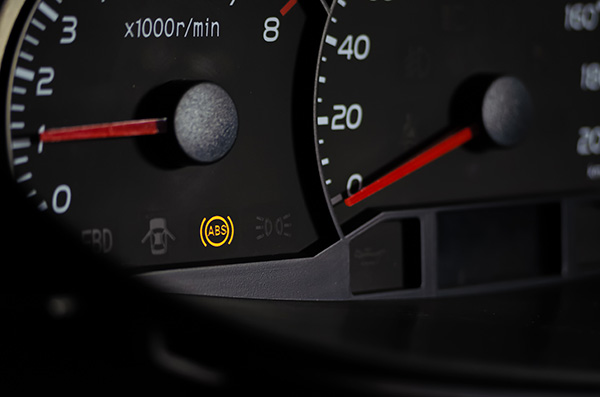
It’s easy to overlook dashboard lights, especially when your vehicle still seems to drive just fine. But if your ABS warning light turns on, it’s not something to ignore. Your Anti-lock Braking System (ABS) plays an important role in keeping your vehicle stable during sudden braking or on slippery roads. When that light appears, it’s a sign that something in the system isn’t working as it should.
Let’s break down what the ABS does, why the warning light may be on, and what steps you should take next.
What Does the ABS Do
Your ABS is designed to prevent the wheels from locking up when you brake hard. Instead of allowing the wheels to stop spinning completely, the system quickly pulses brake pressure to maintain traction and keep the wheels turning. This helps you steer and maintain control, especially in emergencies or when driving on wet, icy, or loose surfaces.
If your ABS isn’t working properly, your vehicle could skid instead of slowing down in a controlled manner. That doesn’t mean your brakes won’t work at all, but it does mean your car could become harder to handle in a tough situation.
What the ABS Light Tells You
The ABS warning light typically looks like a circle with “ABS” in the center and may be amber or yellow. When it comes on briefly at startup, that’s normal, and it means the system is doing a self-check. But if the light stays on while you’re driving, it indicates that a fault has been detected in the ABS.
Some vehicles may also trigger the traction control or stability control lights, as these systems are often linked to the ABS.
Common Reasons the ABS Light Turns On
There are several possible causes, ranging from simple to more complex:
1. Faulty Wheel Speed Sensor
Each wheel has a sensor that monitors speed and sends data to the ABS control module. If one of these sensors fails or gets dirty, the system can’t accurately measure wheel movement. This is one of the most common reasons for an ABS light.
2. Damaged Sensor Wiring
The wiring connected to each sensor is exposed to the elements and road debris. Over time, it can become corroded or broken, interrupting the signal to the control unit.
3. Bad ABS Module
The module is the brain of the ABS system. If it malfunctions, it may not process sensor input correctly, leading to the light staying on.
4. Low Brake Fluid
Some ABS systems monitor brake fluid level as part of their diagnostics. If the level is too low due to a leak or worn pads, it can cause the ABS warning light to activate.
5. Blown Fuse or Relay
If the fuse that protects the ABS circuit blows, the system will shut down. Similarly, a faulty relay can interrupt power to the system.
Will My Brakes Still Work
Yes, your brakes will still function without the ABS system, but without that added layer of safety. In normal driving conditions, you may not notice a difference. However, during emergency stops or while driving on slick roads, the lack of ABS could cause the wheels to lock up, increasing stopping distance and reducing control.
This is why the ABS light should never be ignored. It signals a safety system that’s no longer operating as designed.
How to Respond When the ABS Light Comes On
Start by checking your brake fluid level. If it’s low, top it off with the correct fluid type and monitor the light. If it stays on or comes back after turning off, you’ll want a professional diagnostic to identify the cause.
Driving with the ABS light on for extended periods is never recommended. Even if everything seems fine, hidden problems could compromise your ability to stop quickly when you need it most.
Preventing Future ABS Issues
Regular brake inspections are the best way to catch issues early. During routine service, technicians can inspect wheel sensors, check fluid levels, test modules, and ensure the system is working properly. Keeping the area around the wheels clean and avoiding harsh impacts from potholes or curbs can also help prevent sensor damage.
If you ever feel reduced braking power, pulsating brakes when they shouldn’t be, or traction control inconsistencies, it’s smart to schedule an inspection even before the light comes on.
ABS Diagnostics and Repair in Martinez, CA
At Hagin's Automotive in Martinez, CA, we’re equipped with advanced diagnostic tools to pinpoint the exact cause of your ABS warning light. Whether it’s a sensor, module, or fluid issue, our experienced team can restore your vehicle’s safety systems and give you peace of mind.
Don’t take chances with your brakes and schedule a visit to Hagin’s Automotive today and drive confidently, no matter the conditions.